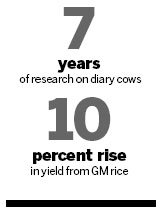
The Ministry of Agriculture has approved animal testing on human-like milk from genetically modified (GM) dairy cows.
If certified, the milk would become China's first transgenic animal product in commercial use.
The cows can produce the protein lactoferrin found in human milk, Xinhua reports.
A component of the human immune system, the highest natural concentrations of lactoferrin are found in "first milk" produced just before a mother gives birth. It is especially important to infant growth.
Li Ning, a member of the Chinese Academy of Engineering who led research into the GM cows, said lactoferrin in human milk is difficult to produce on a large scale, Xinhua reported.
After seven years of research, Li's team and several biotech companies together developed the dairy cows using proprietary technologies.
The milk produced contains the highest level of lactoferrin in the world, he said.
The milk from such GM cows has prospects for use in infant formula milk powder, health foods and medicines, according to experts.
Developing new biological varieties through GM technology was among the goals listed for national science and technology during the 11th Five Year Plan period (2006-2010).
Chinese scientists made several GM breakthroughs over those five years.
"Transgenic technologies have provided effective solutions to many problems in farm production - strengthening crop resistance to disease, reducing use of chemical insecticides and improving crop strains," said Li Jiayang, vice-president of the China Academy of Sciences (CAS).
"Experts have created a batch of valuable genes with intellectual property rights to foster advanced pest-resistant crops," Li added. "The project is a powerful support to sustainable agricultural development."
He said transgenic pest-resistant cotton is one of the remarkable achievements, with 36 new varieties created between 2008 and 2010.
Now cultivated across 11 million hectares, the GM cotton accounts for 93 percent of domestic production, helping break the heavy reliance on imported cotton, according to statistics released by the Ministry of Science and Technology.
Experts have also cloned a key gene that profoundly changes the rice plant. Known as Ideal Plant Architecture 1 - or IPA 1 - the GM rice "can raise the yield and make the stalks grow stronger", Li said.
Tests show the yield increased 10 percent over normal breeds of rice, he noted.
"Developing new types of crop breeds using biotechnology is a trend in agricultural science," said Yuan Longping, a hybrid rice scientist. "China now leads the world with its hybrid rice technologies, but the advantages will be lost in 10 years without enhanced research on transgenic seeds."
"The progress will give birth to a new industrial revolution," said Xu Zhihong, an expert at CAS.
"Research and use of GM products has a strategic importance in building an innovation-oriented country, guaranteeing food security and meeting the challenge of sustainable agricultural development," Xu said.
China Daily
(China Daily 04/13/2011 page17)
